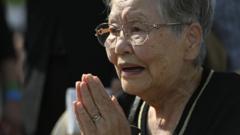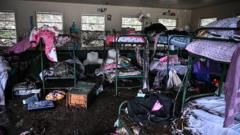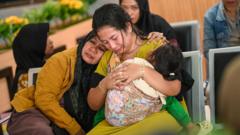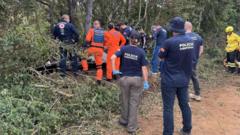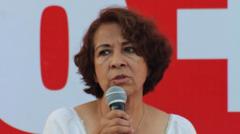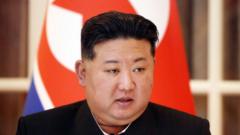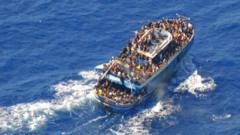On the 80th anniversary of the US atomic bombing of Nagasaki, Mayor Shiro Suzuki warned about the escalating threats of nuclear war, urging an end to global conflicts and advocating for peace.
Nagasaki Mayor Urges Global Leaders to Prevent Nuclear Conflict on 80th Anniversary of Atomic Bombing

Nagasaki Mayor Urges Global Leaders to Prevent Nuclear Conflict on 80th Anniversary of Atomic Bombing
Nagasaki’s mayor calls for peace as the city remembers the tragic bombing anniversary amid ongoing global conflicts.
In a solemn ceremony held in Nagasaki, Mayor Shiro Suzuki delivered a poignant Peace Declaration, marking the 80th anniversary of the US atomic bomb attack that devastated the city on August 9, 1945. The mayor expressed deep concern about the increasing tendency for international conflicts to escalate into violence, suggesting that the current trajectory could lead to another nuclear confrontation. "Conflicts around the world are intensifying in a vicious cycle of confrontation and fragmentation," Suzuki stated, reiterating the importance of ceasing hostilities where "force is met with force."
The bombing of Nagasaki, which followed the tragic destruction of Hiroshima three days earlier, resulted in the loss of an estimated 74,000 lives and left many survivors suffering devastating health effects from radiation exposure. This year’s commemoration was particularly significant, as it marked eight decades since that fateful day, when communities were obliterated within moments. Attendees, including survivors, offered water during the ceremony, a symbolic tribute to the victim's desperate pleas for relief after the bomb dropped.
As global conflicts, such as the war between Russia and Ukraine and the ongoing clashes in Israel and Gaza, dominate current affairs, Mayor Suzuki emphasized the necessity to remember past horrors. "On 9 August 1945, an atomic bomb was dropped on this city," he remarked. "Now, 80 years since that day, who could have possibly imagined that our world would become like this?" The ceremony was marked by a moment of silence, and for the first time since the bombing, Nagasaki's twin cathedral bells rang out together, delivering a powerful message of peace.
Amidst the discussions of global security, the mayor highlighted the recent invitation extended to Israel, Russia, and Belarus for this year’s commemoration—an attempt to bridge divides that had emerged in previous years. Notably, the Treaty on the Prohibition of Nuclear Weapons, which took effect in 2021 and gained ratification from over 70 countries, highlights ongoing debates regarding nuclear deterrents and their implications for national security.
Today, as Nagasaki reflects on its past and commemorates the lives lost, the call for peace gains urgency amid flourishing conflicts globally, reminding us of the shared responsibility to prevent the horrors of war from recurring.
The bombing of Nagasaki, which followed the tragic destruction of Hiroshima three days earlier, resulted in the loss of an estimated 74,000 lives and left many survivors suffering devastating health effects from radiation exposure. This year’s commemoration was particularly significant, as it marked eight decades since that fateful day, when communities were obliterated within moments. Attendees, including survivors, offered water during the ceremony, a symbolic tribute to the victim's desperate pleas for relief after the bomb dropped.
As global conflicts, such as the war between Russia and Ukraine and the ongoing clashes in Israel and Gaza, dominate current affairs, Mayor Suzuki emphasized the necessity to remember past horrors. "On 9 August 1945, an atomic bomb was dropped on this city," he remarked. "Now, 80 years since that day, who could have possibly imagined that our world would become like this?" The ceremony was marked by a moment of silence, and for the first time since the bombing, Nagasaki's twin cathedral bells rang out together, delivering a powerful message of peace.
Amidst the discussions of global security, the mayor highlighted the recent invitation extended to Israel, Russia, and Belarus for this year’s commemoration—an attempt to bridge divides that had emerged in previous years. Notably, the Treaty on the Prohibition of Nuclear Weapons, which took effect in 2021 and gained ratification from over 70 countries, highlights ongoing debates regarding nuclear deterrents and their implications for national security.
Today, as Nagasaki reflects on its past and commemorates the lives lost, the call for peace gains urgency amid flourishing conflicts globally, reminding us of the shared responsibility to prevent the horrors of war from recurring.

